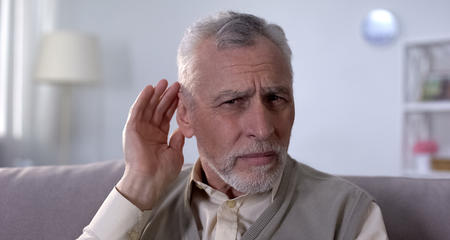Whether you need help with your hearing, balance or a chronic ear infection, our ear specialists can help. The Ear, Nose and Throat Program (Otolaryngology) at Froedtert & the Medical College of Wisconsin has the experienced, leading-edge Koss Cochlear Implant Program and is widely recognized as a leader in other medical and surgical treatment of ear disorders.
The Koss Cochlear Implant Program
Cochlear implants are used to bring sound to people with severe hearing loss. While once restricted to people with complete hearing loss, cochlear implants are now being used in some people with partial (residual) hearing. Learn more about this specialized treatment provided through the Koss Cochlear Implant Program.
Medical Management of Ear Disorders
Oral medication, ear drops and/or therapeutic exercises can help many ear disorders, including tinnitus (ringing in the ears), vertigo (dizziness) and ear infections. Our physicians prefer to exhaust all appropriate medical therapies before turning to surgery as a treatment option.
Devices to Aid With Ear Disorders
Technology has made great strides when it comes to helping people hear. A variety of devices are available to help people remain safe and independent despite a hearing problem.
- Hearing aids are personal amplifiers adapted to fit and function according to your hearing loss and communication needs so you can hear sounds more loudly and clearly.
- Assistive listening devices (ALDs) make it easier for hearing in specific places. ALDs can help if you’re having trouble with TV viewing, telephone calls, safety alerts, classroom settings, movies, church services and other situations. Assistive listening devices help hearing impaired or deaf people stay safe and independent.
- Protective devices come in all forms, from ear plugs to earmuff-style headsets. Protect your ears to prevent hearing loss or keep it from getting worse.
Our specialists are familiar with virtually every device on the market, and can help you find the one that’s best for you.
Surgical Management of Ear Disorders
Sometimes, surgery is necessary to restore hearing or to relieve pressure on the auditory nerve (the nerve that conducts sound from the ear to the brain). Surgery can also be used to drain fluid from the ears or to repair damage to the ear drum.
Common surgical procedures performed on the ear include:
Tympanoplasty is used to fix holes in the ear drum. Tympanoplasty helps to prevent recurrent ear infections, protect the middle ear and restore hearing capability. If necessary, the surgeon can repair the bones of the middle ear during a tympanoplasty.
Mastoidectomy is a procedure that removes the bony mastoid cells of the ear to improve aeration and remove chlolesteatoma (destructive skin cysts) from the middle ear. It is often done to cure chronic ear infections and to restore hearing in patients with longstanding ear disease in conjunction with tympanoplasty.
Ear tube insertion (myringotomy). Ear tubes – small, plastic tubes that promote drainage – allow air to reach the inner ear and prevent fluid buildup behind the ear drum. Ear tubes are frequently used in patients who have had lots of ear infections, or in patients who have hearing loss due to fluid buildup in the ear. The surgery takes about 15 minutes and can be performed in-office or in the operating room. (Adult ear tubes are almost always placed in-office; children’s tubes are almost always placed in the operating room.)
Our surgeons also use specialized surgical techniques to treat acoustic neuromas (non-cancerous tumors of the auditory nerve), pituitary adenomas (non-cancerous tumors on the pituitary gland) and cholesteatomas (inner ear skin cysts).
Virtual Visits Are Available
Safe and convenient virtual visits by video let you get the care you need via a mobile device, tablet or computer wherever you are. We'll assess your condition and develop a treatment plan right away. To schedule a virtual visit, call 414-777-7700.

